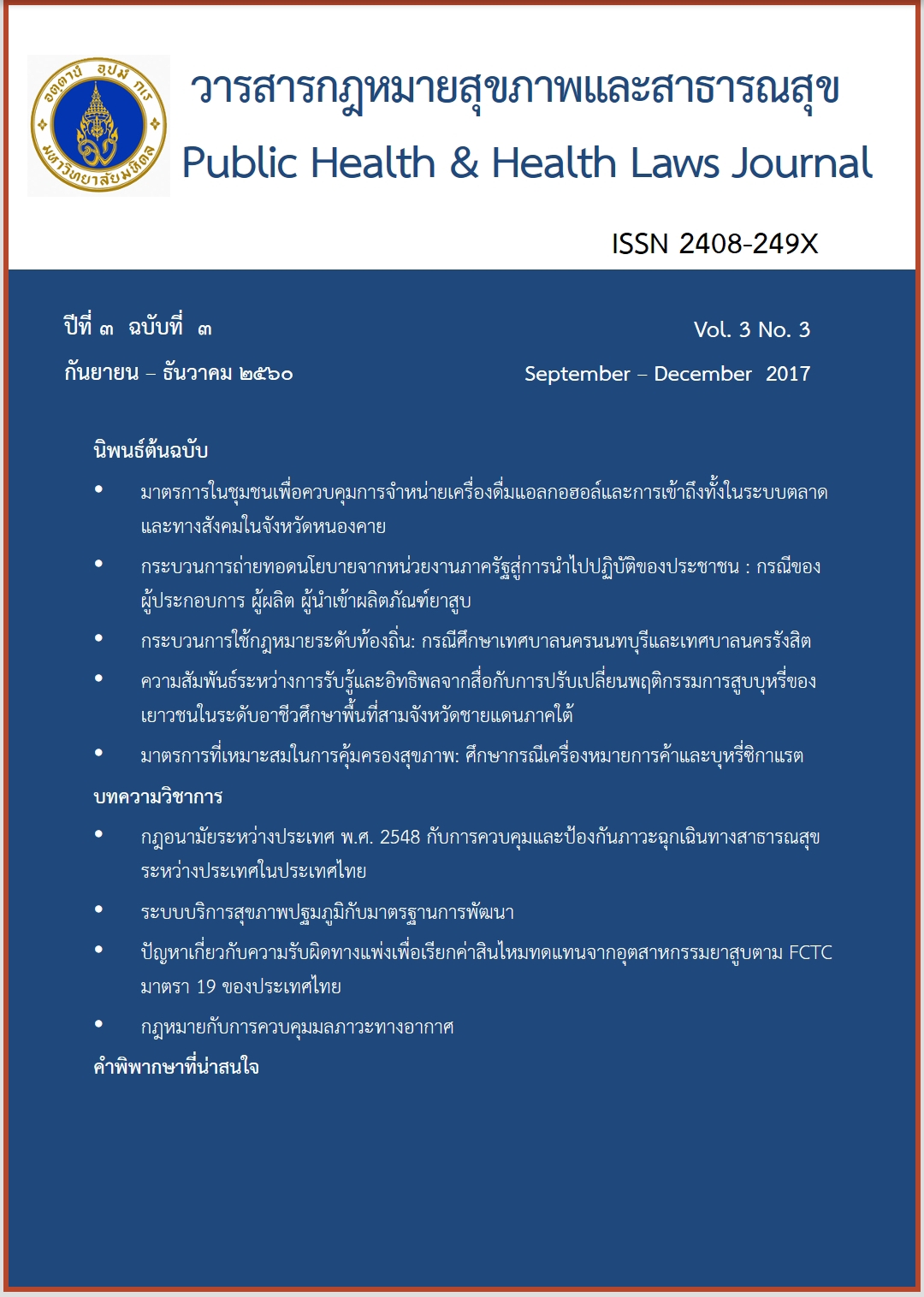International Health Regulation 2005 and Public Health Emergency of International Concern Prevention and Control in Thailand
Keywords:
International Health Regulation, Public Health Emergency International ConcernAbstract
This study aimed to review the implementation of International Health Regulation for a prevention and control the public health emergency of international concern. The International Health Regulation 2005 is a legal agreement and has purposes to prevent, protect against, control and provide a public health response to the international spread of disease in ways that are commensurate with and restricted to public health risk, and which avoid unnecessary interference with international traffic and trade. The state parties have to develop certain minimum core public health capacities; a) core capacities requirements for coordination, communication of event information and adoption measures. And b) core capacities for responding to events that may constitute the public health emergency of international concern. Thailand have accepted the IHR 2005 since 2007 and applied the IHR 2005 for prevention and control and surveillance public health incidence such as; control of the spread of influenza 2009, Ebola virus infectious disease surveillance and Middle East respiratory syndrome surveillance. However, Thailand implementation IHR 2005 focusing on the infectious disease only. This article has a recommendation for public health agencies and relevant agencies for developing public health plan under the IHR 2005 and managing public health incidence to cover up the health threat from chemicals, radioactivity or biological weapons.
References
กลุ่มโรคติดต่อระหว่างประเทศ สำนักโรคติดต่อทั่วไป กรมควบคุมโรค. (2559). คู่มือการประเมินตนเองการพัฒนาสมรรถนะหลักของช่องทางเข้าออกประเทศ ท่าอากาศยาน ท่าเรือ และพรมแดนทางบก. พิมพ์ครั้งที่ 4. กรุงเทพฯ: สำนักพิมพ์อักษรกราฟฟิคดีไซน์.
คณะกรรมการป้องกันและบรรเทาสาธารณภัย. แผนการป้องกันและบรรเทาสาธารณภัยแห่งชาติ พ.ศ. 2558 [อินเทอร์เน็ต]. 2558 [เข้าถึงเมื่อ 8 พฤษภาคม 2560]. จาก: http://122.155.1.143/upload/download/file_attach/55acacb4f1f7c.pdf.
ภัทรวรินทร์ บุญชู. (2555). การปฏิบัติให้เป็นไปตามข้อบังคับว่าด้วยกฎอนามัยระหว่างประเทศ (ค.ศ.2005) ขององค์การอนามัยโลก. วิทยานิพนธ์ปริญญานิติศาสตรมหาบัณฑิต สาขากฎหมายระหว่างประเทศ มหาวิทยาลัยธรรมศาสตร์.
สำนักระบาดวิทยา กรมควบคุมโรค กระทรวงสาธารณสุข. (2551). แผนพัฒนางานด้านกฎอนามัยระหว่างประเทศ พ.ศ. 2548 (2005) ในช่วงปี พ.ศ. 2551 – 2555. พิมพ์ครั้งที่ 1. นนทบุรี: กรมควบคุมโรค กระทรวงสาธารณสุข: 2551.
สำนักโรคติดต่อทั่วไป กรมควบคุมโรค กระทรวงสาธารณสุข. (2553). กฎอนามัยระหว่างประเทศ พ.ศ. 2548 (ฉบับปรับปรุงครั้งที่ 2). พิมพ์ครั้งที่ 2. กรุงเทพฯ: สำนักงานกิจการโรงพิมพ์องค์การสงเคราะห์ทหารผ่านศึกในพระบรมราชูปถัมภ์.
สำนักโรคติดต่ออุบัติใหม่ กรมควบคุมโรค กระทรวงสาธารณสุข. (2557). คู่มือปฏิบัติการโรคติดเชื้อไวรัสอีโบลา (Ebola Virus Disease) สำหรับผู้ปฏิบัติงาน. พิมพ์ครั้งที่ 1. กรุงเทพฯ: สำนักงานกิจการโรงพิมพ์องค์การทหารผ่านศึก: 123-47.
Aranka A, Eric D, Helge GH, Maxwell CH, Kumanan W. (2012). Descriptive review and evaluation of the functioning of the International Health Regulations (IHR) Annex 2. BioMed Central: Globalization and Health; 8: 1:1-9.
Delon PJ. (1975). The International Health Regulation: A Practical Guide World Health Organization. (Geneva1975): 21.
World Health Organization. About WHO [Internet]. 2015 [cite 2015 Nov 8]. Available from: http://www.who.int/about/en/.
World Health Organization. (2006). Constitution of the World Health Organization. Basic Documents [Internet]. Forty-fifth edition Supplement. Article 21, 22. October 2006 [cite 2015 Nov 8]. Available from: http://www.who.int/governance/eb/who_constitution_en.pdf.
Downloads
Published
How to Cite
Issue
Section
License
Disclaimer and Copyright Notice
The content and information presented in articles published in the Journal of Law and Public Health Policy represent the opinions and sole responsibility of the respective authors. The editorial board does not necessarily agree with or assume any responsibility for the views expressed.
All articles, data, content, images, and other materials published in the Journal of Law and Public Health Policy are the intellectual property of the journal. Any individual or organization wishing to reproduce, distribute, or otherwise use the entirety or any part of such materials must provide proper citation.





